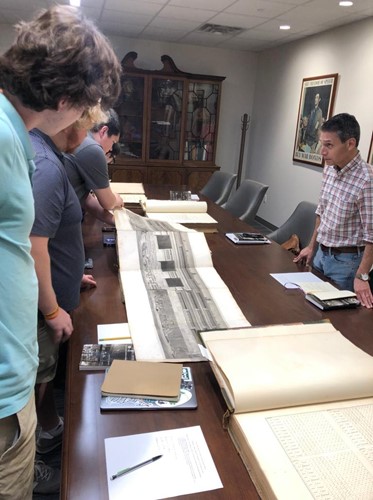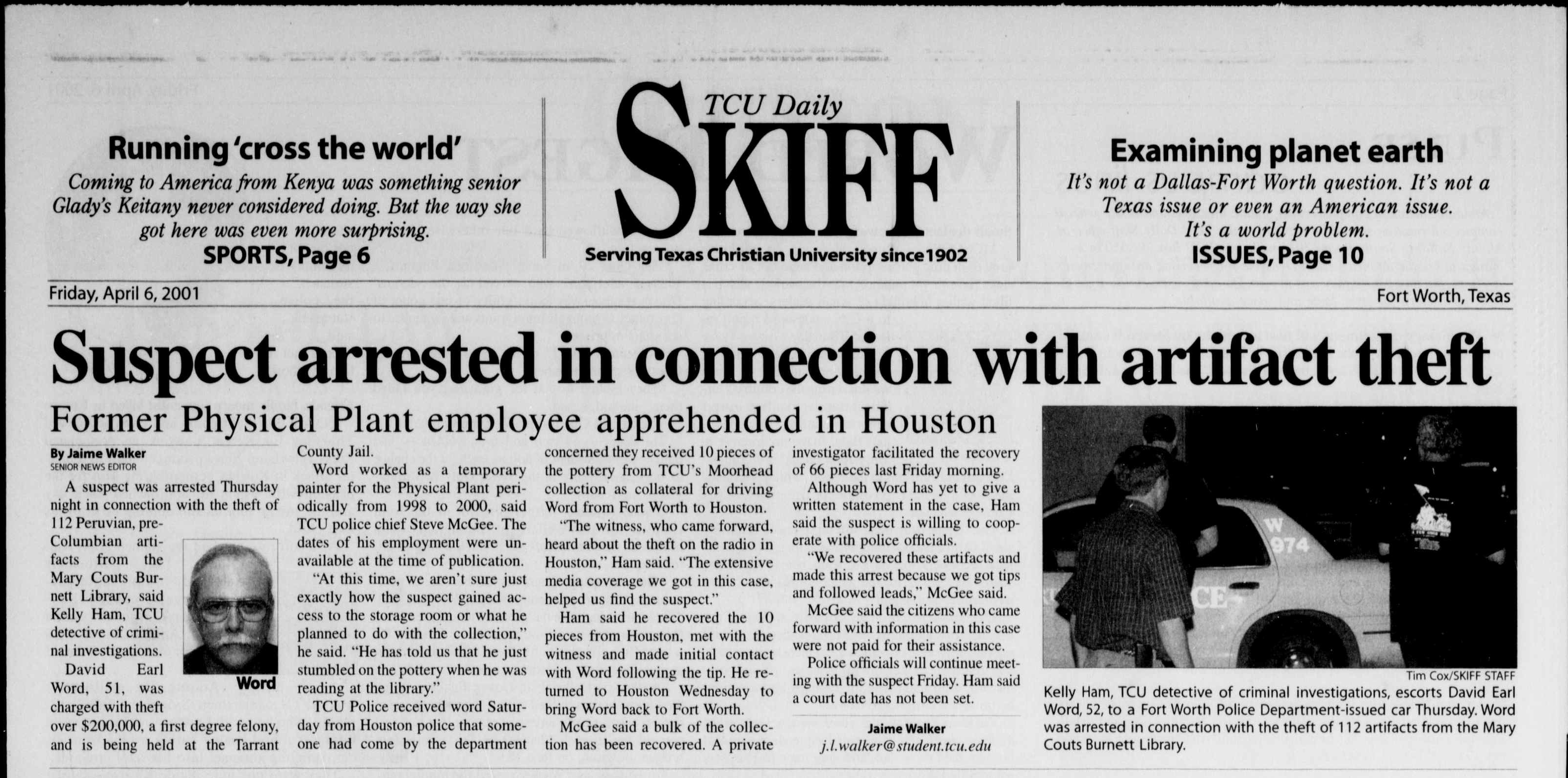Grad students investigate pre-Columbian antiquities heist
 When first-year PhD student Meghan Scott-Chaber signed up for the Graduate Research Seminar in Latin American History with Dr. Alex Hidalgo, she was skeptical about whether or not she would enjoy the class. “Like most students,
I hate group work,” said Scott-Chaber, “so I did not expect to enjoy the process of
putting together a group presentation and article. However, the experience turned
out to very valuable and actually pretty fun.” Meghan and the six other students in
HIST 80903 have spent the semester investigating a present-day true crime story that
has yet to be solved. In 2019, Julie Christenson, the Rare Book Curator in TCU’s Special
Collections informed Dr. Hidalgo that the university housed pre-Columbian objects
in the Department of Sociology and Anthropology. She also shared that the objects
were stolen by a former employee stole in 2001. To this day some of the artifacts
have never been recovered. That meeting in 2019 planted the seed for what would turn
into an invaluable learning experience for Dr. Hidalgo, his students, and members
of the community who have and will learn about their work.
When first-year PhD student Meghan Scott-Chaber signed up for the Graduate Research Seminar in Latin American History with Dr. Alex Hidalgo, she was skeptical about whether or not she would enjoy the class. “Like most students,
I hate group work,” said Scott-Chaber, “so I did not expect to enjoy the process of
putting together a group presentation and article. However, the experience turned
out to very valuable and actually pretty fun.” Meghan and the six other students in
HIST 80903 have spent the semester investigating a present-day true crime story that
has yet to be solved. In 2019, Julie Christenson, the Rare Book Curator in TCU’s Special
Collections informed Dr. Hidalgo that the university housed pre-Columbian objects
in the Department of Sociology and Anthropology. She also shared that the objects
were stolen by a former employee stole in 2001. To this day some of the artifacts
have never been recovered. That meeting in 2019 planted the seed for what would turn
into an invaluable learning experience for Dr. Hidalgo, his students, and members
of the community who have and will learn about their work.
Traditionally, research seminars involve students reading a set of common books and individually investigating a topic of their choice to produce an article length paper at the end of the semester. Some students may incorporate aspects of these papers into their dissertations, while others may present their work at conferences. But it is much rarer for students to see their work published. As Dr. Hidalgo put it, “Much of the research that gets produced in graduate seminars never sees the light of day.” However, for this class, Dr. Hidalgo adjusted the typical research seminar model in ways that incentivized students to engage first hand in historical research and publishing, activities typically reserved for students finished with their coursework . “For one, we are all working on the same project: investigating the 2001 theft of the Moorehead Collection from campus,” Dr. Hidalgo said. “More importantly, the goal of the seminar is to write a collaborative piece based on our findings that we can publish in an academic or public-facing venue.” With a few more weeks left in the semester, Dr. Hidalgo and his students have already begun to attain widespread notoriety for their project and writing. They have received an invitation to submit their work for an edited volume on TCU history, they have successfully pitched an article to a major Texas magazine (both pieces are expected to appear in print next year), and they have presented their work to the greater campus and Fort Worth community at a public event co-hosted by the Center for Texas Studies and the Fort Worth Public Library.
It would be difficult to decide which aspect of Dr. Hidalgo’s course has been for his students. Not only have they learned basic research skills similar to those taught in his past graduate seminars. They have aslo gained experience with a wider array of core professional skills. “Because of the nature of the project, they also learned to work collaboratively,” Dr. Hidalgo explained. “We divided research and writing tasks, shared our research findings, engaged in thoughtful peer-review, and drafted historical questions together in order to better understand recurring themes, including repatriation, art donations, looting, collecting, and tax fraud.” When asked how this experience will help her in her graduate career and beyond, first-year MA student Sofía Gómez-Pichardo said, “surely, this seminar is not only about common schoolwork or the practices of thinking, reading, speaking and writing...Practicing my script, reviewing my presentation, and gaining research skills has helped me feel prepared to present in my non-native language: English. Working in a group is something rare to find in academia, or at least that is what my colleagues have said. Yet, we have worked incredibly well as a team. This seminar was a very good space to strengthen that skill.” Scott-Chaber also shared what new skills and techniques she has acquired. “I have learned to cite sources I have never used before, like zoom calls, emails, and even police reports. I also learned how easy it is to conduct interviews, as daunting as they may seem. I have gained experience in investigative journalism, which is something I have not done in any other history class.”
Outside of the student impact, the work done in Dr. Hidalgo’s class has shone a light on the under-scrutinized practice of museum collecting and the ways that private and public institutions around the U.S acquire artwork. Addressing the importance of this project to those who may not have a day-to-day connection to the topic, Scott-Chaber said “People all over the world visit museums to gawk at art and antiquities, admiring both their aesthetic and educational value. We hope to learn about the cultures that created them, but we don't question how they arrived in the museum in the first place. We accept that they were acquired by ethical means, because why would we question reputable institutions? Unfortunately, museum collecting is shrouded in secrecy and illegal activity, and this practice is rarely challenged because the global north feels entitled to the global south's cultural property. We must begin to evaluate how privilege has resulted in the commodification and dissemination of objects that often don't rightfully belong to the institutions they're housed in.” Gómez-Pichardo added, “One of the most valuable and important elements that this project can bring is an educational tool for future engagement with pre-Columbian pieces. TCU's collection is an example of many other private and public institutions around U.S. This project can help to seek a more conscious and active interaction with these antiquities through Latin American programs such as the ones that TCU supports. The awareness of the communities and cultures that are held in collections of any institution is vital.”
Click here to view a recording of Dr. Hidalgo and his class presenting their research at a public event co-hosted by the Center for Texas Studies and the Fort Worth Public Library.
